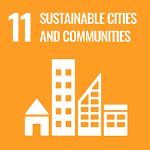About Sustainable Cities and Communities
Make cities and human settlements inclusive, safe, resilient and sustainable.

We work towards the UN's Sustainable Development Goal 11 - Sustainable Cities and Communities, to create a better and fairer world.
The 2030 Agenda for Sustainable Development was adopted in 2015 by all United Nations member states. It provides a blueprint for peace and prosperity for people and the planet.
Find out more about our work across all the UN's Sustainable Development Goals.
Make cities and human settlements inclusive, safe, resilient and sustainable.

TRUUD is a multi-institutional collaboration involving academics from the University of Stirling which aims to change the way decisions are made about urban development to prevent non-communicable diseases in the future. Links have been found between diseases you can’t catch such as type 1 diabetes, heart disease and poor mental health and where people live.
TRUUD researchers are collecting evidence and designing tools and interventions with industry, government and communities to help prioritise health in our urban planning.
The University of Stirling has formed a partnership with the National Trust for Scotland to enhance research, teaching and learning. The collaboration aims to bring together the heritage sector and higher education, building national and international excellence and resilience in the fields of heritage, environment and society.
The National Trust for Scotland is Scotland’s largest conservation charity, with over three million people a year visiting the more than 100 sites it cares for, including ancient houses, battlefields, castles, gardens, coastlines and islands. The University of Stirling is home to the Centre for Environment, Heritage and Policy and is one of Scotland’s leading higher education institutions for research on heritage and environment.
The Intergenerational Living Innovation Hub, established through the Stirling and Clackmannanshire City Region Deal, is a multi-million-pound research and development platform that will respond to the demands of an ageing population, transforming the narrative from one of challenge to opportunity.
Through pioneering novel approaches to ways of living, working and socialising, the hub will co-create the solutions necessary to support an ageing society to adapt to changing its demographics. The hub will develop solutions that enhance wellbeing as we age, providing access to skilled work and driving inclusive economic growth through company creation and inward investment.
There is a global interest in heritage as it has diverse economic, social, and political importance. Heritage encompasses the surviving traces of the past, but also the processes and practices that frame heritage in the present and their impact on the future.
MSc Heritage provides students with excellent training for a career in the heritage sector, supported by critical thinking, in-depth knowledge and wide-ranging skills to also support career development in related sectors such as museums, arts management, and creative industries.
The University’s work on active travel contributes significantly to our efforts to make the University an integral part of making Stirling an inclusive, safe, resilient, and sustainable city.
Through initiatives like Active Travel Week, the University has highlighted to the community how walking, wheeling and cycling can create positive economic, social, and environmental links with the university, the city, and surrounding areas. We’ve continued to promote Nextbike and the Cycle2Work scheme with the aim of cutting down on car miles wherever possible, ensuring cleaner air for everyone to breathe.
The University has worked with partners in the council to understand the impact of how people travel to campus and how the per capita impact of everyone living in Stirling can be reduced by promoting active and sustainable travel. Active travel plays a key role in the University’s pursuit of SDG 11 as we work to promote safe, affordable, and accessible transport for all.
Through Investment Grants available from Scotland’s International Environment Centre (SIEC), Good Green Futures was awarded to lead a project that involved carrying out research and setting up a demonstrator regional hub with a focus on construction materials.
The project would involve research into potential suppliers and customers and a consideration of viable business models as well as setting up a small-scale demonstrator site for a minimum of six months at the Reuse Hub to determine the project's economic viability, with a view to creating an economically self-sustaining project and the Hub being used exclusively for construction materials in the near future.
Led by the Institute of Retail Studies, the Town Centre Action Plan Review Group, reporting to the Scottish Government, developed recommendations to develop and align policies that assist communities and town centres. The proposals aim to strengthen the position of town centres overall and ensure a local embeddedness and focus on working with the local community.
This includes a focus on local accessibility to services, and concepts including 20-minute neighbourhoods, making sure older and disabled people can benefit fully.
Further to this, the group recommended that the Scottish Government seek to expand available funding with a focus on the themes of Enterprising Communities, developing and using patterns in town centred to encourage local small businesses, community enterprises and entrepreneurship and Climate Change Response, retro-fitting town centres and the alteration on spaces in town centres for active travel, pedestrian movement and green space.
Professor Richard Hayne’s National Lottery Heritage Grant for a cultural heritage project in Raploch, Stirling, is based around the life of Billy Bremner and explores the heritage of football in the area and connects different generations around Bremner’s story as one of Scotland’s greatest footballers. This has led to a partnership with various agencies to create a permanent memorial to Bremner in Raploch.
The first milestone was a heritage blue plaque at the site of his home on Weir Street, and the next stage is a sculpture. One impact is the bringing together of different organisations to support life in the community and its built environment.
Partners include Raploch Community Council, Inspiring Communities (formerly Raploch Community Partnership), Stirling Community Enterprise, Stirling Council (including two local councillors), Scottish Football Supporters Association and Leeds United supporters' groups.